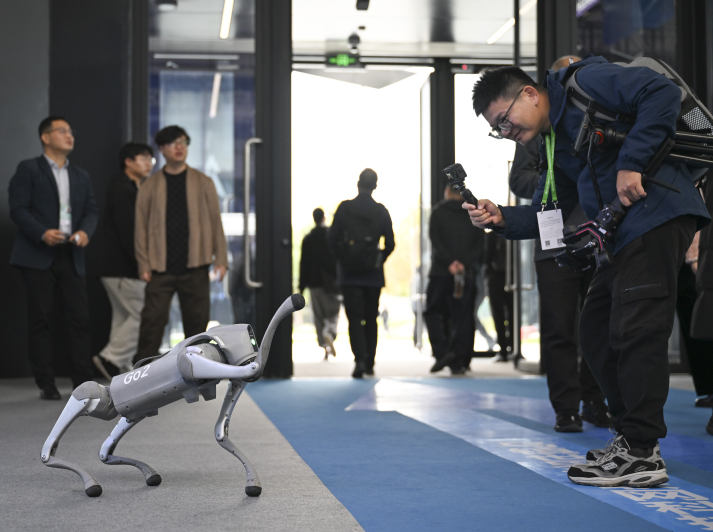| China |
| Building a connected digital future | |
|
|
 The overseas exhibitors section of the Light of Internet Expo at the World Internet Conference (WIC) Wuzhen Summit in Wuzhen, Zhejiang Province, on November 19 (XINHUA)
The 2024 World Internet Conference (WIC) Wuzhen Summit took place in the ancient water town of Wuzhen, Zhejiang Province, from November 19 to 22. China's largest and most prestigious Internet conference, the event has been held in Wuzhen for 11 consecutive years.
Themed Embracing a People-Centered and AI-for-Good Digital Future—Building a Community with a Shared Future in Cyberspace, this year's summit attracted 665 exhibitors from home and abroad. Participants showcased cutting-edge technological achievements across the digital spectrum—from algorithm models and data computing abilities to application scenarios. Highlights included innovations in the low-altitude economy, intelligent connected vehicles, humanoid robots and digital cultural innovation. Progress and challenges "The Wuzhen Summit this year coincides with the rapid development of artificial intelligence (AI), which has brought unprecedented changes to social life through emerging applications," Vice Chairman of the WIC Francis Gurry told China Central Television. Eddie Wu, CEO of Chinese e-commerce giant Alibaba Group, shared at the conference that many companies have been restructuring their products over the past year with the help of AI. In sectors like automotive manufacturing and pharmaceuticals, AI has revolutionized research and development, production processes and scientific research, reshaping the global tech landscape. "At this stage, large language models (LLMs) are the mainstream direction in AI development. Their integration into industries such as education, healthcare and agriculture provides inclusive digital services that ensure and improve people's livelihoods," he said. Qi Xiangdong, Chairman of Chinese cybersecurity company Qi-Anxin, highlighted the transformative impact of AI-driven technology on the cybersecurity industry. "A single AI-powered robot can now perform the work of 60 top-tier cybersecurity analysts, allowing teams to address complex security incidents far more efficiently," he told Xinhua News Agency. "This advance represents a big leap in global efforts to enhance digital security." As AI rapidly evolves, guiding it toward good purposes has also become a focal point of discussion. Wu Shenkuo, Deputy Director of the China Internet Association Research Center, explained that "AI for good" encompasses three levels of meaning: The goals of AI research should benefit the public; AI applications should be based on principles of benevolent use; and specific ethical values and requirements should be integrated into AI regulation and governance. To address these issues, China's first AI model attack and defense competition, the Global AI Defense Challenge, concluded at the WIC on November 20. The top 10 teams from around the world faced scenarios where "seeing is not believing; hearing is not believing," using LLMs to identify fake audio, videos and certificates. The competition intended to directly address and resolve the hidden risks in the application of large models, promoting the healthy and sustainable development of the global AI industry. Since its launch in September, the competition saw more than 2,700 teams and over 3,200 tech elites from 18 countries and regions sign up. "Through such practical exercises, we can directly confront the security issues in LLM applications, pushing forward the continuous advancement of AI safety technology," Wang Weiqiang, chief scientist at the security lab of Ant Group, China's biggest payments provider, told Xinhua. Meanwhile, as AI fraud has already become a real and pressing social issue, the competition aimed to gather industry efforts to seek effective ways to combat this risk.  A visitor videos a smart robotic dog at the World Internet Conference Wuzhen Summit on November 19 (XINHUA)
Digital bridge The annual event also released two reports: the World Internet Development Report 2024 and the China Internet Development Report 2024. The former placed China second among 52 economies globally in terms of Internet development, achieving a score of 69, just behind the United States. This ranking evaluates six indicators: information infrastructure, digital technology and innovation capability, digital economy, digital government, cybersecurity and international governance in cyberspace. The China Internet Development Report 2024 revealed that China's online audiovisual market, encompassing long and short videos, livestreaming and audio sectors, had reached 1.15 trillion yuan ($159 billion) as of late 2023. Additionally, the domestic gaming industry recorded a total sales revenue of approximately 303 billion yuan ($50 billion) during the same period. "Our digital cultural products are diverse and globally accessible, transcending cultural boundaries and garnering international acclaim," said Qian Xianliang, Deputy Director of the Chinese Academy of Cyberspace Studies. He highlighted the success of the Chinese mythology-inspired video game Black Myth: Wukong, which has captivated global audiences since its release in late August, spurring discussions and generating sales exceeding $1 billion on leading gaming platform Steam by October. Sun Jiashan, an associate researcher at the Central Academy of Culture and Tourism Administration, emphasized that the digital culture industry, including video games, short videos and livestreaming, has become a cornerstone of China's cultural sector. It leads the integration of culture and technology, "weaving traditional Chinese culture into modern civilization through digitalization." Sun also pointed out the pivotal role of emerging technologies like AI and particularly large language models in the growth of digital culture. "Advanced technologies are transforming the international dissemination of Chinese culture," Sun explained. For instance, AI-powered translation has drastically reduced the costs of translating Chinese online literature into multiple languages, enhancing global accessibility more efficiently than ever before. He concluded, "The advancements in digital technology and infrastructure not only boost localized cultural production and dissemination but also promote cultural diversity and foster global dialogue and mutual respect among different cultures." At a WIC's sub-forum focusing on cultural exchange and mutual learning, more than 100 participants, including experts, scholars in cultural fields, heads of international organizations, and prominent figures in cultural exchange initiatives, gathered to discuss the topic. During the forum, the China Foreign Languages Publishing Administration, one of the organizers, released the 2024 Annual Report on the Chinese Cultural Symbols International Communication Index. Attendees shared exemplary cases and insights on the transmission of culture via the Internet. David Gosset, founder of the China-Europe Forum, expressed that globalization is a continuous and evolving process, particularly in the digital age. He stressed how the Internet facilitates exchanges between civilizations, and encouraging dialogue and understanding. Gosset advocates for a path of inclusivity, openness and mutual respect, underpinned by human dignity and shared interests, to ensure that globalization and Internet development benefit more people. American scholar Richard Sears shared his journey in digitizing ancient Chinese characters at the forum. Since 2002, he has operated a website enabling users to explore the history of individual Chinese characters. He is also leveraging videos to teach about these characters. Reflecting on changes over the decades, he said, "Fifty years ago, few foreigners showed interest in learning Chinese, let alone reading or understanding ancient scripts. Now, thousands of foreigners are learning Mandarin—and even Cantonese. I hope to continue being part of the story of Chinese character history." Copyedited by Elsbeth van Paridon Comments to yuanyuan@cicgamericas.com |
|
||||||||||||||||||||||||||||||
|